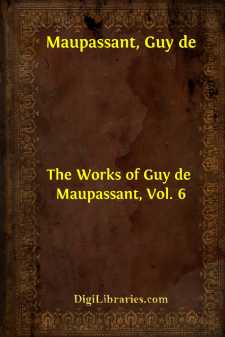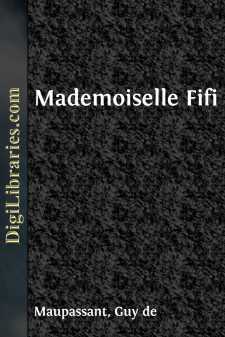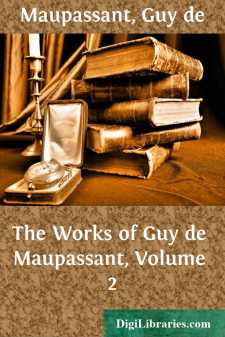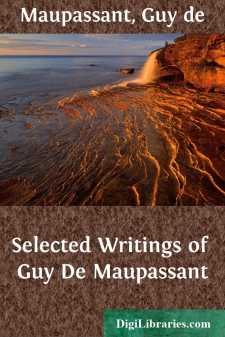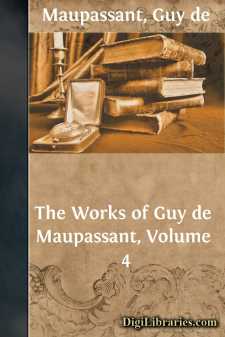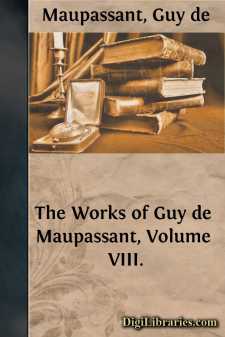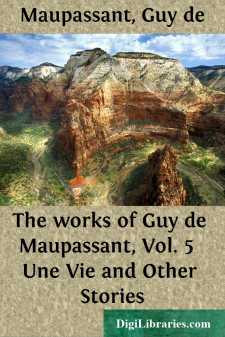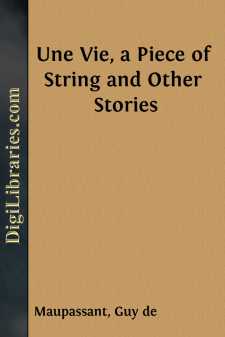Categories
- Antiques & Collectibles 13
- Architecture 36
- Art 48
- Bibles 22
- Biography & Autobiography 815
- Body, Mind & Spirit 144
- Business & Economics 28
- Children's Books 18
- Children's Fiction 14
- Computers 4
- Cooking 94
- Crafts & Hobbies 4
- Drama 346
- Education 58
- Family & Relationships 59
- Fiction 11835
- Games 19
- Gardening 17
- Health & Fitness 34
- History 1378
- House & Home 1
- Humor 147
- Juvenile Fiction 1873
- Juvenile Nonfiction 202
- Language Arts & Disciplines 89
- Law 16
- Literary Collections 686
- Literary Criticism 179
- Mathematics 13
- Medical 41
- Music 40
- Nature 180
- Non-Classifiable 1768
- Performing Arts 7
- Periodicals 1453
- Philosophy 65
- Photography 2
- Poetry 896
- Political Science 203
- Psychology 44
- Reference 154
- Religion 515
- Science 126
- Self-Help 85
- Social Science 83
- Sports & Recreation 34
- Study Aids 3
- Technology & Engineering 60
- Transportation 23
- Travel 463
- True Crime 29
Guy de Maupassant
Guy de Maupassant (1850-1893) was a prolific French writer best known for his short stories, which often depict human nature and the complexities of society with a blend of realism and irony. His most famous works include "The Necklace" and "Boule de Suif," showcasing his keen observation and critique of bourgeois society. Maupassant's literary career was cut short due to mental illness, but he left behind a significant legacy that influenced the short story genre profoundly.
Author's Books:
Sort by:
When the cashier had given him the change out of his five francpiece, George Duroy left the restaurant. As he had a good carriage, both naturally and from his military training, he drew himself up, twirled his moustache, and threw upon the lingering customers a rapid and sweeping glance—one of those glances which take in everything within their range like a casting net. The women looked up at him in...
more...
ACT I. SCENE I. Mme. de Sallus in her drawing-room, seated in a corner by the fireplace. Enter Jacques de RANDOL noiselessly; glances to see that no one is looking, and kisses Mme. de Sallus quickly upon her hair. She starts; utters a faint cry, and turns upon him. MME. DE SALLUS Oh! How imprudent you are! JACQUES DE RANDOL Don't be afraid; no one saw me. MME. DE SALLUS But the servants! JACQUES...
more...
Guy de Maupassant Guy de Maupassant was born at the Chateau de Miromesnil, near Dieppe, on August 5th, 1850. The Maupassants were an old Lorraine family who had settled in Normandy in the middle of the Eighteenth Century. His father had married in 1846 a young lady of the rich bourgeoisie, Laure Le Poittevin. With her brother Alfred, she had been the playmate of Gustave Flaubert, the son of a Rouen...
more...
I Little George was making hills of sand in one of the walks; he took it up with both his hands, made it into a pyramid, and then put a chestnut leaf on the top, and his father, sitting on an iron chair was looking at him with concentrated and affectionate attention, and saw nobody but him in that small public garden which was full of people. All along the circular road other children were occupied in...
more...
GUY DE MAUPASSANT Of the French writers of romance of the latter part of the nineteenth century no one made a reputation as quickly as did Guy de Maupassant. Not one has preserved that reputation with more ease, not only during life, but in death. None so completely hides his personality in his glory. In an epoch of the utmost publicity, in which the most insignificant deeds of a celebrated man are...
more...
Count Eustache d'Etchegorry's solitary country house had the appearance of a poor man's home, where people do not have enough to eat every day in the week, where the bottles are more frequently filled at the pump than in the cellar, and where they wait until it is dark before lighting the candles. It was an old and sordid building; the walls were crumbling to pieces, the grated, iron...
more...
The first aim of art, no doubt, is the representation of things as they are. But then things are as our eyes see them and as our minds make them; and it is thus of primary importance for the critic to distinguish the precise qualities of the eyes and minds which make the world into imaginative literature. Reality may be so definite and so false, just as it may be so fantastic and so true; and, among...
more...
OF "THE NOVEL" do not intend in these pages to put in a plea for this little novel. On the contrary, the ideas I shall try to set forth will rather involve a criticism of the class of psychological analysis which I have undertaken in Pierre et Jean. I propose to treat of novels in general. I am not the only writer who finds himself taken to task in the same terms each time he brings out a new...
more...
The most robust and masculine of recent French novelists is a typical Norman, sprung from an ancient noble family, originally of Lorraine, but long settled in the Pays de Caux. The traveler from England towards Paris, soon after leaving Dieppe, sees on his left hand, immediately beyond the station of St. Aubin, a handsome sixteenth-century house, the Château de Miromesnil, on a hill above the railway....
more...
"I entered literary life as a meteor, and I shall leave it like athunderbolt." These words of Maupassant to José Maria de Heredia onthe occasion of a memorable meeting are, in spite of their morbidsolemnity, not an inexact summing up of the brief career during which,for ten years, the writer, by turns undaunted and sorrowful, with thefertility of a master hand produced poetry, novels, romances...
more...


